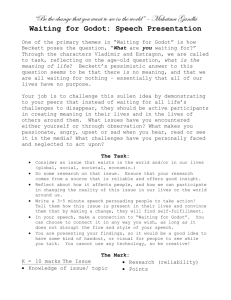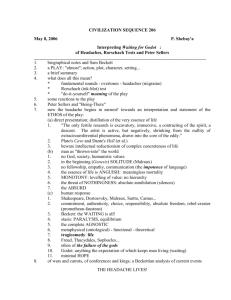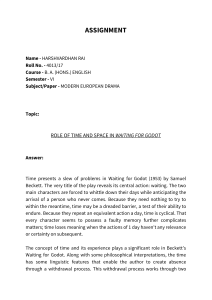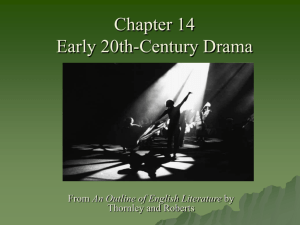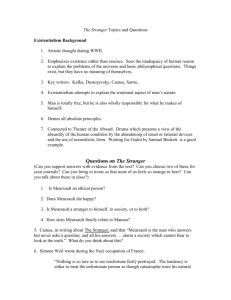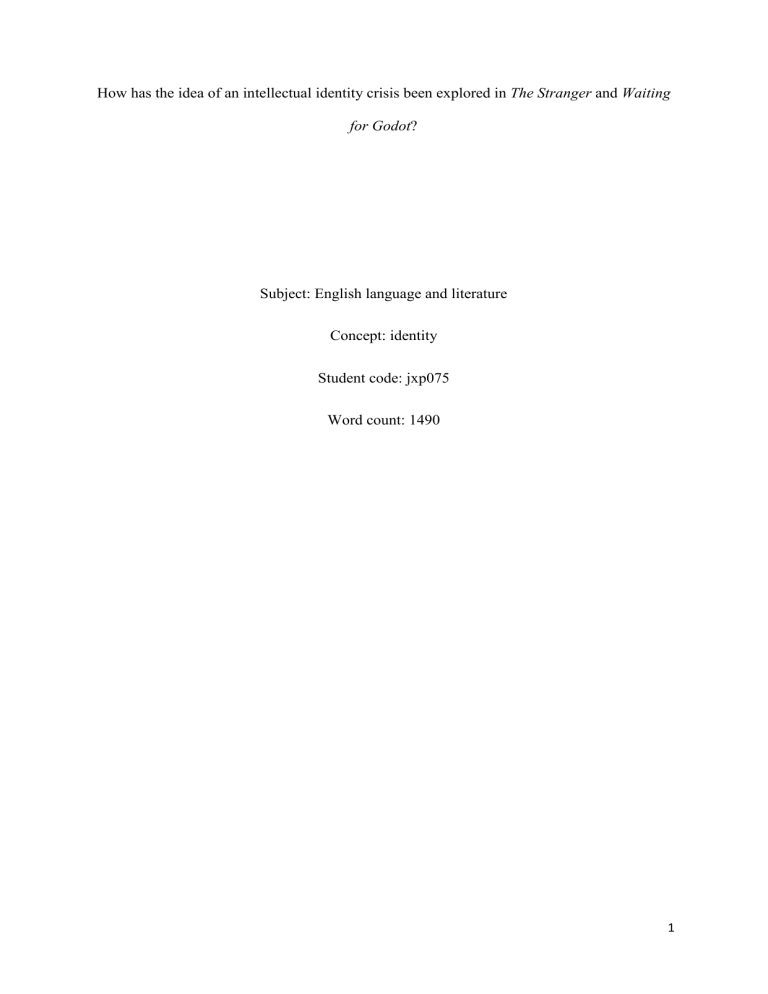
How has the idea of an intellectual identity crisis been explored in The Stranger and Waiting for Godot? Subject: English language and literature Concept: identity Student code: jxp075 Word count: 1490 1 Table of contents Introduction……………………………………………………………………...3 Literary analysis……………………………………………………………...….3 Character analysis…………………………………………………………….....4 The effect of society…………………………………………………………….5 Conclusion…………………………………………………………………........6 Bibliography…………………………………………………………………….7 2 Introduction Every literary work possesses a certain theme or concept in which it revolves around; whether it be fiction, non-fiction or anything from biographies to fantasies, the central axis of that work is the most important part of it. As evident in Albert Camus’ The Stranger and the play Waiting for Godot by Samuel Beckett, many ideas are sought out but few are truly explored and delved deep into. Notions like the absurd, nihilism, inertia, change, loss of identity, and interactions are the basis of these works. Through this essay, we will be exploring the aspects of identity crises that have been considered in the former and latter along with a socio-psychological approach from the minds of the main characters within the scopes of culture, identity and community. The selected global issue culture, identity, community focuses on the methods in which factors such as family, class, nationality, religion and others might affect individuals within a society. With an extensive focus on specific individuals, this text has aimed for deep contextual analyses of both works. Literary analysis The Stranger possesses many themes such as meaninglessness, absurdity, isolation and alienation which all work together to introduce the feeling of loneliness within the novel. This work utilizes absurdity as a type of literary device apart from it being its central subject through the main character. Meursault can possibly be regarded as an individual who is in constant change unlike his severed character since he does not protest nor follow life the way that it is meant to be, if there even is a meaning to it. Even though he is and acts disconnected from the world, he still tries to reminisce the feeling of having someone to care for him, possibly adding to his sense of existentialism. Foreshadowing, imagery, irony, and allusions are some of the further devices used in this novel. 3 Some of Waiting for Godot’s themes are about existentialism, nihilism, satiric humor and human dependence. There is not one definite answer for what this play tries to present since it is open to various interpretations. Beckett’s most commonly used literary device is allusion, with many references to God, the Bible and mythology being omnipresent in the play. Ironic paradoxes are also used, with the most evident example being Lucky’s name; in spite of his name, he is actually the most unlucky and abused character of all. Vladimir and Estragon’s friendship – being the yin and yang that it is – shows that they are the protagonists of the story, while Pozzo is presumably the antagonist. Overall, Waiting for Godot takes a more ironic approach towards life rather than the serious and overwhelming concept of mortality and immortality. Character analysis Meursault, as first introduced with in The Stranger, is a very cold individual who grasps nothing but emptiness in the world. It might seem like this persona is a pretty plain, simple and obvious character to start with, however, it is evident to the audience that there’s more than meets the eye going on inside the mind of this magnificently senseless – yet clever– being. He is an individual that is completely stripped away from any source of meaning towards life and doesn’t ponder the reasons for existence any more. Typically from a psychological standpoint, such a perspective is gained after the complete opposite experience. Perhaps Meursault had a point in his life that he had some hope for living, a notion to fight for or persevere to accomplish, but was then rejected and understood that the truth is different than what is initially perceived. Another possibility is the fact that death is certain and there is no escape; perchance being what caused him to lose all sense of sentiments and excitements in life. There can be many possibilities as to why Meursault is the way he is, though it is not possible to reach a certain conclusion because this idea has not been explored much in the novel; however, what 4 we can conclude is that the idea of identity crises has been explored using society and curiosity as precursors of depression, post-traumatic stress disorder (PTSD), mild schizophrenia, and antisocial personality disorders or Asperger syndrome. In Waiting for Godot, the situation is perhaps more complex since there is not one single character that can be regarded as the main protagonist since all of them are complementary to each other. Estragon, Vladimir, Lucky, Pozzo, and Boy all act as important pieces in the grand scheme of things. Godot is just the completion of all these characters in their most powerful form. What the idea of Godot has presented to the viewers is the state of human suffering that is inevitable for everyone, whether being the same form or not. Godot is the true embodiment of uncertainty – as life was for Meursault – in the play and is the foreseeable death that is yet to come, though also presents the false hope of human attachments that come to existence from lingering subconscious discrepancies. There cannot be life without death, pleasure without pain, and many other features that complete each other; very similarly to Estragon – Validmir and Lucky – Pozzo. The effect of society Society tends to play crucial roles in the cognitive development of individuals, especially during times of stress and change. Meursault, being the devoid person that he is, is in no way affected by society. The humanity in the novel has specific norms that force people into different categories, and that is what Meursault disregards. He is the pebble in the current that is not willing to go with the flow or change according to it, rather just stays a remnant of its being. Conversely, the indifference that he feels is only subject to him and does not project it onto other people willingly. Being an atheist also adds to his sense of loneliness and deprivation because individuals who believe in certain rules and beliefs tend to be more hopeful than someone who does not because the attached individuals already have limits and 5 restrictions to abide by. Meursault was never given any reason to abide by laws or notions, he was the lone wolf that lost himself as he went astray. His character arc presents itself from the usual lonely, alienated, hopeless being, to that of a more mature, though not hopeful character. At the end of the story, Meursault came to the very slight realization that life may have some meaning because he received and was able to confront the idea of being truly alone and uncertain which in this case came from him waiting to be executed. It is apparent that Meursault’s cognitive bias is explored/affected by personal and exterior factors, yet possesses no true change according to the norms he is opposed by; society had no effect on him whatsoever. Beckett points to humans as futile and useless beings when presented with opportunities to leech onto a notion that makes them dependent. He also shows the absurdity in life by demeaning the true understandings that are brought from communication through the expression of repetition in behavior; like Vladimir and Estragon’s never-ending mental feuds. Waiting for Godot even sparked a revolution in the routine idea of theatre, having made it more down-to-Earth and human-like than fantastical in some cases. It showed that complexity can be brought from the simplest of things like human interactions. Some perspectives have pointed out that Godot is actually the representation of God and not death, while others say the opposite; however, both possibilities can be valid given as to how the play can be regarded as being openended. Conclusion To conclude, The Stranger truly tries to bring light to the darkness in the world by making people realize their values and core beliefs; whether affected by religion or other societal norms. Society, mental disorders, his own life, and even Meursault himself were all approaches that Camus took in order to show the mental struggles that life and absurdity 6 presents upon individuals. Death is the certainty that comes from doubt. On the other hand, Waiting for Godot is the culmination of the idea of having false idols and core values. One’s understanding of the play is dependent on their own perspectives towards life and standards, having an individual think of it as a play on words for absurdism, while others might perceive it as a work more focused on the ideas of life and death or dependence and independence. Waiting for Godot was Beckett’s own escape from his line of work and life. Bibliography Beckett, S. (1949). Waiting for Godot by Samuel Beckett. First edition by Faber and Faber Ltd. McDonald,. Ronan, et al. Camus, A. (1942). The Stranger First Vintage International Edition. Knopf, Alfred A. 7
